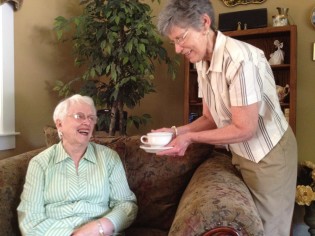 During my 4 hour orientation and in many of my presentations I show a 2 and ½ minute video titled “What is That?” It is a clip made in Greece with sub titles and it gives a quick look at living with someone with Alzheimer’s Disease. Many people who see it react at first with some anger towards a son who sits with his father. His father asks him over and over again “what is that?” and soon the son has had it. The question is easy to answer, it’s just the repetition, the over and over and over again that drives him crazy.
During my 4 hour orientation and in many of my presentations I show a 2 and ½ minute video titled “What is That?” It is a clip made in Greece with sub titles and it gives a quick look at living with someone with Alzheimer’s Disease. Many people who see it react at first with some anger towards a son who sits with his father. His father asks him over and over again “what is that?” and soon the son has had it. The question is easy to answer, it’s just the repetition, the over and over and over again that drives him crazy.
We have had numerous calls to Seniors Helping Seniors of NH for assistance with a parent who has been diagnosed with some form of dementia. These calls all come from loving and caring people. But they are people who need a break. One woman who works from home describes the constant interruption for the same question, 50 to 100 times a day, the same question and the same interruption.
Another wonderful daughter calls because if she does not get out tonight she just might drive herself off a bridge. And she wants to stay alive to take care of her mother for as many years as she has left.
The very first secret to great care giving is to get help. This can be through a business like Seniors Helping Seniors of NH where you know that you will have senior care providers who have passed background checks and gone through many qualifying interviews and training, or it can be through a friend or an adult day program. Either way, make sure that when you get help it is great help.
What does that look like? First, great care giving comes from a caring heart. A wonderful caregiver is not in this for the money but for the love. They understand that it is through giving that we receive.
One of our providers writes that it is a blessing to fix a breakfast for the 88 year old woman who she visits each morning because that 88 year old woman is going through a hard time with her husband just admitted to the hospital. How many times have we fixed breakfast in our lives and how often do we consider it a blessing?
A great caregiver looks first at who the person is and then at their diagnosis. He or she wants to know about the family they raised, the work they did, and things that make them an individual, unique and wonderfully made. They look at pictures and get clues if the story can no longer be told first hand. They ask family questions. And then they may sing that favorite song, they may read from that favorite book, they may just sit quietly together. And they will answer the same question over and over with love and patience.


I feel like I have learned so much from our Alzheimer’s training. Real life. Real tips that work.